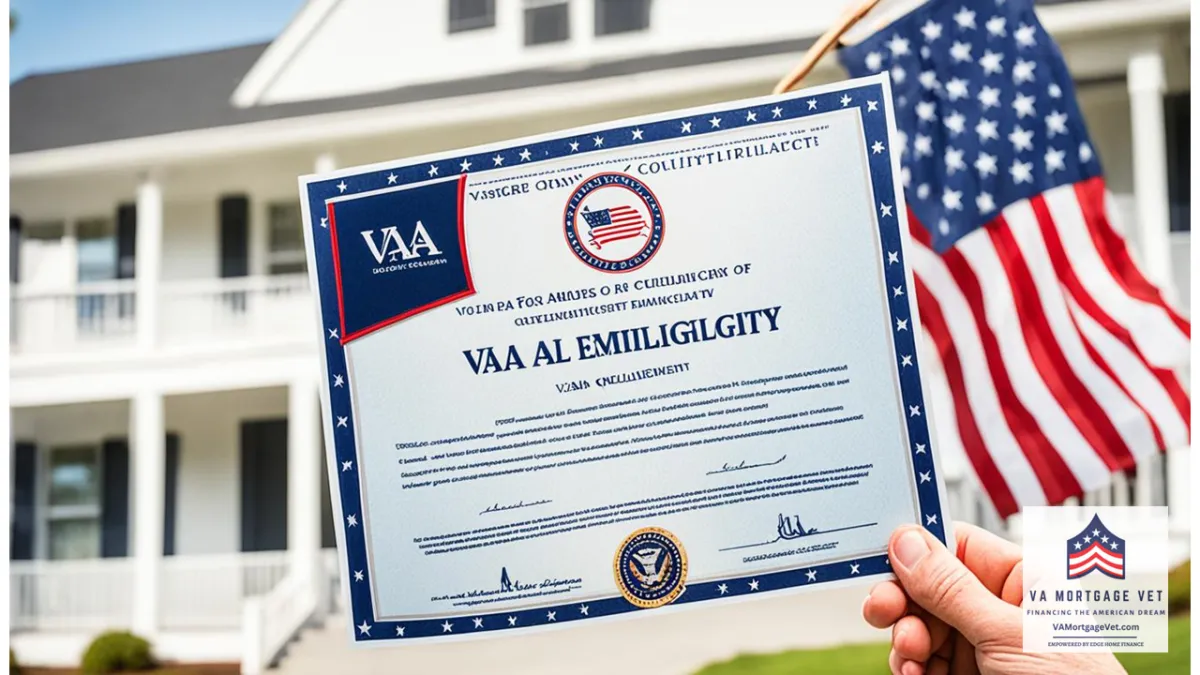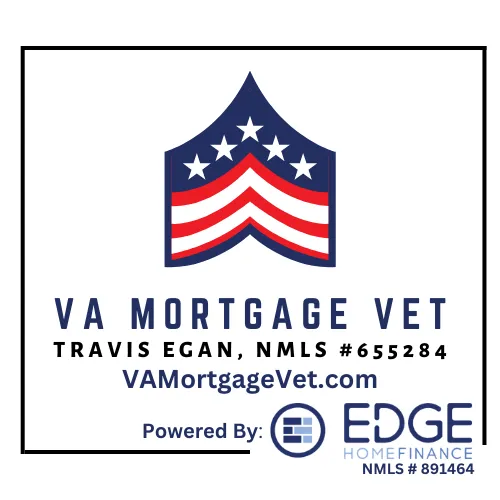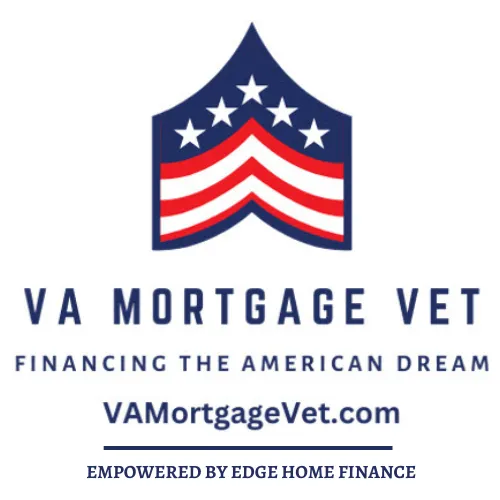COMING SOON: My new Book
"Boots to Roots: A Step-by-Step Roadmap for Turning
Your Military Service into a Lifetime of Home Ownership Success."
I HATE WHEN VIDEOS PLAY AS SOON AS THE PAGE OPENS
CLICK PLAY BELOW FOR A SPECIAL MESSAGE

How Hard Is It to Qualify for a VA Loan? VA Home Loan Eligibility
Being in the military, I learned how important a good home is. VA loans help a lot. The U.S. Department of Veterans Affairs is supporting you. VA loans allow no down payment and have good interest rates. Now, how tough is it to get a VA loan?
"A nation's strength lies in the homes of its people." - Franklin D. Roosevelt was the 32nd U.S. President, leading the nation through the Great Depression and World War II.
To get a VA home loan, you or your spouse must meet certain service rules. How long you need to serve depends on the service time, but it's usually from 90 days to 24 months. If you served from August 2, 1990, to now, you need 90 days if you left for special reasons. If not, you need to have served 24 months continuously.
You also need a Certificate of Eligibility (COE) to show you're eligible when you apply to a lender. You can request your Certificate of Eligibility online through VA's eBenefits. Two-thirds get their certificate right away. Or you can get it through a VA lender, online, or send a form by mail.
Then, you must meet your lender's rules on credit and income. Every lender is different, but most need a FICO score of 580 for a VA loan. Even if you fail to meet the service length, you might still get a COE. For example, if you left because of hardships or some medical condition, you might still be eligible.
Although there are steps to follow, getting a VA mortgage is simpler than a regular loan. Getting ready with help from a good lender can make your dream of owning a home come true with a VA loan.
Key Takeaways
VA loans help military service members, veterans, and some surviving spouses buy homes with good terms
Minimum active-duty service requirements for VA loan change based on the service period
A valid Certificate of Eligibility (COE) is needed to show lenders you qualify
Most lenders need a credit score of at least 580 for VA loan support
VA loans have good points like no down payment and fair interest rates
Understanding VA Loan Eligibility Requirements

To get a VA loan, you need to meet certain criteria set by the Department of Veterans Affairs. You should have served a certain length in the military. This period can change based on when you served. A lot of VA lenders want you to have a credit score of at least 580, (500 in certain rare circumstances).
Minimum Active-Duty Service Requirements for VA Loans
You need 90 days of active duty service to get a VA loan. But, the time you need to serve can change. It may be 24 months or a number of days, depending on when you served. During war, you need 90 days of service. In peacetime, it's 181 days.
Eligibility for Veterans, National Guard, and Reserve Members
National Guard and Reserve members' requirements also change by service time. If you didn't serve the minimum, there are exceptions for some discharges. These include hardships, cuts in force, and certain medical conditions.
Eligibility for Surviving Spouses
Some spouses of veterans can also get a VA loan, like those whose spouse is MIA or POW. Those married to Veterans who died from service-related issues can also get loans. They qualify even if they remarried, but under certain conditions.
Getting a COE is crucial for a VA loan application. Fortunately, almost 2/3 of COE requests are approved right away. You might need extra documents like DD Form 214 or NGB Form 22 for your COE.
Remember, private lenders might ask for more than the VA does. They look at your DTI and residual income too. To fully understand your VA loan options, talking to a specialist is wise.
Obtaining a Certificate of Eligibility (COE)
A VA loan Certificate of Eligibility (COE) is proof you can get a VA loan. Active-duty military, veterans, National Guard, Reserves, and spouses may apply. Getting a COE is important for a VA loan. It shows you're eligible for this great benefit.

Applying for a COE Through a VA-Approved Lender
Getting your COE through a VA lender is easy. They will use your information to find it online. This can be done almost instantaneously. Your lender will help and tell you what other papers you might need, like DD214.
Applying for a COE Online Through the VA's eBenefits Portal
Applying online at the VA's portal means you can print your COE right away. You may qualify if you've served for a certain time. This also includes National Guard and Reserve members who served for at least 90 days from August 2, 1990, to now.
Applying for a COE by Mail
You can also mail in your COE application using VA Form 26-1880. Send it to your VA regional loan center. For some, if you had a hard time leaving the service, it might take up to a year to check. Spouses of veterans may get a COE too, if they qualify under the VA’s rules.
If you had to leave the service for special reasons or due to health problems, you might still get a COE. Even U.S. citizens who helped in WWII or in certain roles might qualify. To get another VA loan after one before, you need to sell or pay back the old loan. You can ask for this by sending VA Form 26-1880 to the VA center.
COE Application Method Process Timeline VA-Approved Lender Lender pulls COE electronically 30 days to 6 weeks VA eBenefits Portal: Apply online and print COE: Instant to a few days Mail (VA Form 26-1880) Send completed form to VA regional loan center Up to 1 year for complex cases
Remember, a COE lets lenders know you fit the service needs for a VA loan. But it isn't a promise that you'll get a loan. That depends on the lender’s rules, like how your credit looks. For more help on getting a VA loan, call your VA center at 877-827-3702.
Meeting VA Lender Requirements
VA lenders usually need a credit score of 580 or more for a VA loan. If your score is lower, you may need to raise it. This will help you get a VA-backed home loan, even if you're eligible.
Credit Score Requirements for VA Loans
The VA loans don't need a perfect credit score. They're more lenient than traditional or FHA loans. Yet, having a higher credit score is always good. It raises your chances of getting the home you want with a VA loan.
Income and Debt-to-Income Ratio Requirements
Besides your credit score, VA lenders also look at your debt-to-income (DTI) ratio. They like it to be under 41%. But, if your ratio is higher, you can still qualify with enough leftover money. This is after you pay your debts and housing fees.
Residual Income Requirements
Residual income is what you have after paying your debts and bills. It's important for VA lenders to be sure you can afford extra costs. The amount needed changes with family size, where you live, and the loan size. Your lender will figure this out for you.
Meeting VA lender needs shows you're ready for a VA loan. Every lender can be a bit different on their rules. So, it's wise to have a VA loan expert help you. They can show you what to do to get a VA loan that fits your needs.
How Hard Is It to Qualify for a VA Loan?
Qualifying for a VA loan is easier than for many other loans. It's good for those thinking about a VA loan. You don't need a down payment, which helps you buy a home more easily. First, you need to get a Certificate of Eligibility (COE). This shows you meet the VA's service rules.
Most VA lenders ask for a FICO score of at least 580 to give you a loan. This score requirement is lower than for a lot of other loans. It's easier for people with lower credit scores to get a VA loan. VA loans also tend to have low interest rates. They have had the best rates for at least two years, as Optimal Blue's data shows.
The VA itself doesn't say you need a certain credit score. But, having a good score, like 580 or more, can help you get a loan. Also, there's a limit on how much lenders can charge in closing costs. This rule helps veterans save money over time with a VA loan.
Did you know that the VA Mortgage Vet team works with over 100 lenders and has lenders that will allow you to qualify for a VA loan with a 500 credit score?
To get a VA loan, you must have served a certain amount of active duty, based on when you served. For instance, if you were in the Vietnam War era, you would need 90 days of active duty. Different service periods have different requirements. This includes National Guard and Reserve service.
Even if you don't meet these service rules, you might still get a COE. For instance, if you were discharged because of a service-related injury, or, if you're the spouse of a veteran who passed away or is missing, you could be eligible.
Getting your COE and meeting the credit and income rules is a big step. After that, the VA loan process usually takes 30 to 45 days. There are many VA loan options, from buying a new home to making your current home more energy efficient. A VA loan can be a great way to reach your dream of owning a home.
Common Reasons for VA Loan Denial
VA loans have easy credit rules and good perks. However, they can still be hard to get. It's smart to know why your VA loan might be refused. This helps you work on fixing problems. Then, you can more likely get home.
Insufficient Credit Score
Not having a good credit score often stops a VA loan. The VA doesn't have a minimum credit score. But many lenders want at least a 580 credit score. Your score matters a lot. Big changes in your credit might mean no loan. HMDA data shows that in 2022, 12.93% of VA loan applications were denied.
High Debt-to-Income Ratio
Too much debt can also stop a VA loan. Lenders like a debt-to-income (DTI) ratio under 41%. Some let it be higher with enough extra money. Having leftover money after paying bills is important. If you don't, your loan might not go through.
Application Errors and Inconsistencies
Mistakes on your loan form can be a problem. Put down right and full information. False or hard-to-prove income can stop a loan too. So, be sure to show all your income. Checking your papers well can help avoid mistakes.
Other things that might deny your VA loan are:
Some lenders have extra rules, called overlays, which can be tough to meet.
Changing jobs can worry lenders. Stay at the same job for a better chance at your loan.
Don't wait to get all the needed papers. Delays can cause a loan to be refused.
Sometimes, loan denials are out of your control. Like laws changing or issues with the property.
Fixing your credit or income may help get a loan later. If one lender says no, try others. Each may have different reasons for saying no. Fixing what caused your first denial can help with your next application.
Improving Your Chances of Qualifying for a VA Loan
If you're looking at a VA loan for your dream home, knowing the rules is key. The VA wants lenders to be flexible, but you still need to meet some steps. Boosting your credit score, cutting your debts, and making more money are good moves. They increase your chances of getting a VA loan.
Boosting Your Credit Score
VA lenders like to see a credit score of 580 or more, even if there's no set score needed. It's always good to have a higher score. Paying bills on time, lowering credit card debts, and fixing credit report mistakes can help. Good credit habits over time make you look better to lenders.
Reducing Your Debt-to-Income Ratio
Lenders also look at your debt-to-income (DTI) ratio closely. The VA suggests a 41% or less DTI is best. To cut your DTI, pay off debts or earn more money. A lower DTI shows you have enough to handle your month-to-month costs. This makes getting a VA loan more likely.
Increasing Your Residual Income
Residual income is what's left after all monthly bills are paid. The VA has tables breaking down how much is needed, based on where you live and family size. To raise this, spend less or make more money. With a higher residual income, it helps if your DTI is a bit high. Lenders see you as a better risk this way.
Improving your credit, slicing debts, and earning more can make a big difference for your VA loan chances. The VA loan is here to make owning a home possible for veterans, service members, and their families. By working on these important areas, you're closer to your dream home.
VA Loan Down Payment and Property Requirements
VA loans let you buy a house with no down payment. About 75% of VA loans in Fiscal Year 2022 had zero down. And 80% of Veterans don't put money down on their home.
No down payment is a big reason why Veterans pick VA loans. This information comes from a Veteran Homebuyer Survey.
Sometimes, a down payment is useful. If a home's price is more than it's worth, you must pay the extra. It can also help in competitive markets to win over sellers. And not all veterans can get a loan with 0 down.
Putting some money down lowers a special fee, which can be up to 3.3% of the loan. For first-time users, the fee is usually 2.15%. But it's 3.3% for those who have used a VA loan before.
Disabled veterans and some other service members don't have to pay this fee. Having immediate equity and reducing future loan fees are other benefits of a down payment.
But, most people who get VA loans don't put money down. This might sometimes help get your loan approved quicker.
The home also needs to meet the VA's standards. It must be safe and in good condition. An appraisal checks the home's value and state. Remember, loan limits don't bar veterans from borrowing more; they limit how much they can borrow without a down payment.
VA loan rates are normally lower by about 0.25% than conventional loans.
Even with its benefits, only 6% of veterans and servicemembers have used VA loans in the past five years. This could be because they don't fully understand the program. Yet, with the right help, VA loans are a great way for veterans and servicemembers to buy homes.
Eligibility for Other VA Loans and Grants
The Department of Veterans Affairs has more than the VA home loan. It offers other loans and grants. These help veterans with special needs. This includes those with service-connected disabilities. It also helps Native American veterans who want to buy or improve homes on federal lands.
Disability Housing Grants
Veterans with service-connected disabilities can get housing grants. These grants help them buy, build, or change homes to fit their needs. There are three types of grants:
Specially Adapted Housing (SAH) Grant: Helps veterans with certain disabilities make homes more accessible.
Special Housing Adaptation (SHA) Grant: Lets veterans modify or buy homes to suit their disabilities.
Temporary Residence Adaptation (TRA) Grant: For eligible veterans living with family can get help to make homes accessible temporarily.
The grants have different rules based on the grant and each veteran's needs. Always check with the VA for the latest information on how to apply.
Native American Direct Loan Program
The NADL program aids Native American veterans and their spouses. It allows them to improve or build homes on tribal lands. It has these benefits:
Open to Native American veterans and their spouses
Requires no down payment or mortgage insurance
Has low costs to close and is flexible
Can be used for homes on tribal lands
To qualify, veterans must meet the VA's service rules and have a COE. The home must also meet VA's property rules and be on tribal land.
Loan/Grant Purpose Eligibility Specially Adapted Housing Grant Buy, build, or modify homes for veterans with certain service-connected disabilities Veterans with specific service-connected disabilities Special Housing Adaptation Grant: Modify or purchase homes for veterans with certain service-connected disabilities Veterans with specific service-connected disabilities
Temporary Residence Adaptation Grant: Modify a family member's home for temporary residence of a disabled veteran Veterans with specific service-connected disabilities temporarily residing with family Native American Direct Loan Program Purchase, construct, or improve homes on federal trust lands Native American veterans and their spouses
These programs make a big difference for veterans and service members with special housing needs. By learning about these options, more veterans can use the help available.
Applying for a VA Loan: Step-by-Step Process
Ready to apply for a VA loan? The first step is to find a lender that has the U.S. Department of Veterans Affairs' approval. You see, not all lenders deal with VA loans. Your lender will ask you about your finances, help you get a Certificate of Eligibility, and check your credit and income.
The Certificate of Eligibility shows you can use a VA loan. It's good to get a pre-approval letter. This way, you know how much your loan can be. After this, you can start looking for a home. If your offer is accepted, the lender will check if the home is okay according to VA rules.
Usually, it takes 10 days for the VA to appraise the home. The VA wants homes to meet certain conditions and have a certain value. If the home needs fixing, you might be able to ask the seller to pay for it. Also, you can ask the seller to help with some of your closing costs.
Buyers will need to show a contract with some conditions, like a home inspection. VA contracts protect your money if the home is valued low later on. You might look at a few homes before choosing one.
Did you know that approximately 3,700 Veterans started their quote online for a VA loan today?
Closing time is near; you'll get a document called the Closing Disclosure a few days before. You need to have home insurance and pay some costs at closing. Note that there might be some fees from the lender, like a 1% fee, and other fees too.
Before closing, walk through the home one last time. Make sure you understand all the paperwork before you sign anything, especially details about fees and your real estate agent's role. The whole process should take about 30–45 days from when you first get the contract. The VA Mortgage Vet team averages 18 days from an accepted contract until clear-to-close.
Conclusion
Getting a VA loan is often easier than a regular home loan. The VA is more flexible with credit scores, how much you can put down, and debt rules. VA loans come with low interest and cost less to start. They also let people buy homes with no down payment. To get one, you need to fit the VA's service rule. This rule changes based on when and how long you served. For example, if you served after August 2, 1990, you need at least 24 months of active service, or 90 days if you were called up.
It's key to get a COE to show you can get a VA loan. Some groups, like the widow of a veteran, the spouse of a missing veteran, and some WWII veterans, can get a COE too. You might still qualify even if you don't meet the usual service rules. Things like getting kicked out early for medical reasons or family needs could count. Many VA loan places want a credit score of at least 580. But it's often easier to get a VA loan than a regular or FHA loan.
Learning about how to get a VA loan and working on your credit can help. Also, finding a good VA lender is important. With the right steps, you can get your dream home through a VA loan. The VA has helped over 28 million people buy homes since 1944, making a big difference for veterans and those serving now.
FAQs (Frequently Asked Questions)
Q: What is the minimum credit score required to qualify for a VA loan?
The VA does not set a minimum credit score requirement, but most lenders look for a credit score of at least 580 to qualify for a VA loan.
Q: What are the loan requirements for getting a VA home loan?
To qualify for a VA home loan, you must be an eligible service member, veteran, or surviving spouse. You also need to meet specific income and credit requirements.
Q: How do I get a VA loan?
To get a VA loan, you need to apply through a VA-approved lender. Veteran Mortgage Advisors specialize in VA home loans. They will help you navigate the VA loan process and ensure you meet all the necessary requirements.
Q: What is the credit score requirement for a VA loan?
While the VA does not have a set credit score requirement, most lenders look for a credit score of at least 580 for a VA loan.
Q: What are the requirements for a VA-backed home loan?
The requirements for a VA-backed home loan include being a service member, veteran, or eligible surviving spouse, meeting credit and income requirements, and obtaining a Certificate of Eligibility.
Q: How can I determine if I am eligible for a VA loan?
You can check your eligibility for a VA loan by visiting the VA website or speaking with a VA-approved lender who can help you determine if you meet the service requirements for a VA loan.
Q: What are the payment requirements for a VA loan?
VA loans typically require no down payment, but you may need to pay a VA funding fee. The specific payment requirements can vary based on factors such as the loan amount and your credit score.
For further advice on how to make sure your VA home loan process goes as fast and smoothly as possible, please read our article titled: 5 Steps to Get Pre-Approved for a VA Home Loan Today
Contact Us
5868 Baker Road
Minnetonka, MN 55345
Travis Egan, VA Mortgage Vet
Programs, rates, terms and conditions are subject to change at any time without notice. All approvals are subject to underwriting guidelines.
Restrictions apply depending on program selected.
No official U.S. military or other government agency endorsement is implied.
Copyright © 2024 Edge Home Finance | All rights reserved.
Copyright © 2024 | Edge Home Finance | All rights reserved.





